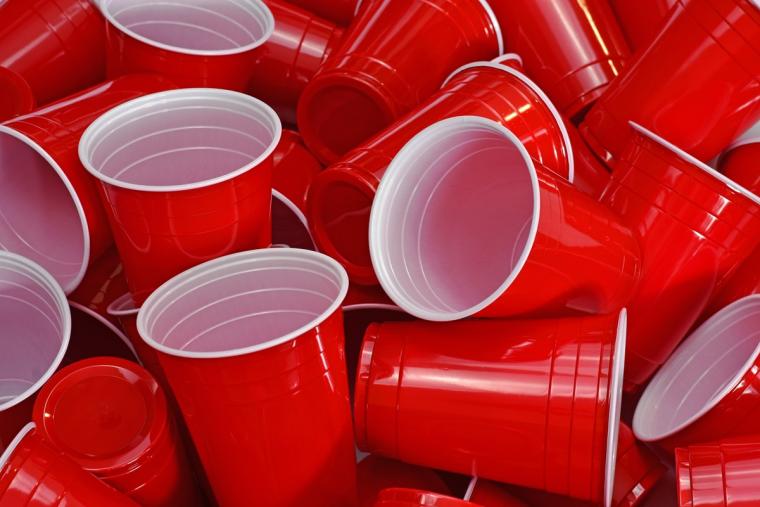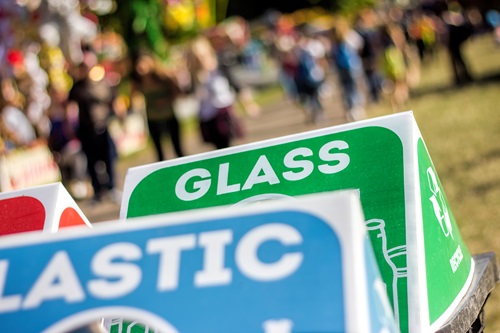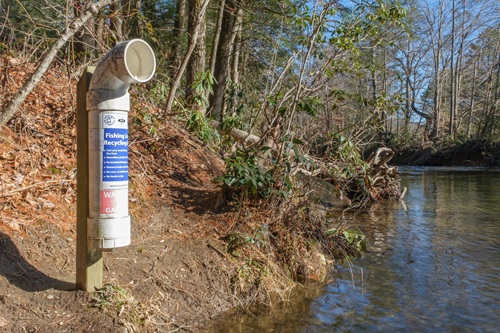
Plastic cups are Public Enemy Number One when it comes to sustainability.
This is the month when Earth Day arrives. In fact, it is April 22, although there is a monthlong focus on sustainability and recycling. But how green is your event, really?
While many spectators are aware that beer bottles and pop cans go into the recycle bins, a lot of mistakes are made, even by those who have the best of intentions.
“Wishcycling is when you put something in the recycle bin because you want to recycle it,” notes the article. “You hope it will get turned into some shiny new object. But you don’t really know if it will and so you decide to let someone else down the line figure it out for you.”
At the same time, there's "oughta-cycling," which is when a user thinks the recycling crew "oughta" wash out that nasty container or that they "oughta" not mind if something is coated with food.
That leads to the recycle bins at sports events holding a lot of items that should not be in there, and that oftentimes leads to the recycling facility being unable to process anything you send them. You can avoid that by knowing what can (and can’t) go into the recycle bin, by changing the offerings at your concession stand and by promoting a better understanding of “what goes where” in terms of trash, composing and recycling bins while a tournament is going on.
 The first thing to do is tackle the misconceptions. In fact, industry leaders have developed a hall of shame of wishcycling:
The first thing to do is tackle the misconceptions. In fact, industry leaders have developed a hall of shame of wishcycling:
Red Solo Cups: Any color or brand of plastic cups, really, as well as Styrofoam cups and those clear plastic cups that Starbucks cold coffee drinks come in. They're all Public Enemy Number One when it comes to recycling.
Why? It's simple, really. You can wash plastic cups and reuse them but recycling facilities don’t have the capacity to do so, and as a result, entire recycling containers’ worth of refuse have to be discarded if they contain those. Instead: Try selling reusable cups and offer discounts and rewards to those who bring their own cups that can be refilled. You can also buy recyclable and compostable cups and offer special bins for each. Online merchants like Amazon have a wealth of listings of such containers.
Pizza Boxes: Pizza boxes can be composted but not recycled. Put out the correct bins and encourage responsible disposal. Food waste and paper plates, for example, can often be composted.
Plastic Plates, Paper Plates and To-Go Clamshell Containers Filled with Food Residue: They’re not recyclable and need to go into the trash. Again, changing over to compostable containers, plates and cups will eliminate these problems. Having special bins to accept the newer, greener options means these (and any food scraps) can be sent off for composting. Online commerce sites can help you find recyclable containers to swap out for these high-waste items.
Plastic Bags: No. Just no. Filmy plastic (also known as “soft film” in recycling circles), including zipper-lock bags, garbage bags, candy bar wrappers, potato chip bags, soft plastic shopping bags and similar items don’t work in any single-stream recycling system.
According to Recycle Coach, unrecyclable materials like soft plastics often cause conveyor belts at recycling plants to become jammed, which puts workers in precarious situations as they try to resolve the issue. It also causes usable materials to be downcycled or sent to landfills because of the contamination. Wishcycling actually increases an event’s carbon footprint rather than decreasing it, as non-recyclable items must be shipped from the recycling plant to the landfill, and it increases taxes because of this additional transportation.
Plastic Cutlery: Yes, they’re plastic. No, they can’t be recycled or reused. Instead, look for wood- or paper-based utensils (available online) that can be put into compost containers when food is finished.
Plastic Straws: Another big offender, these can be replaced with paper straws and in many cases, eliminated altogether. Plastic lids for cups are another enemy of the greening movement. They are not necessary and can be eliminated entirely.
Because differing states (and even counties, cities and jurisdictions within states) have different recycling capabilities, it pays to educate yourself. Simply googling your area, followed by “what can be recycled” can result in a wealth of knowledge. If you are a travel event owner, your sports commission can likely provide you with even more information.
Already, some corporations have begun initiatives and campaigns to raise awareness and promote recycling and sustainability.
Making It a Competition: The Campus Race to Zero Waste is an example of an event that has put recycling in a league of its own. The GameDay Football Zero Waste Touchdown Challenge provides tools and opportunities that inspire, empower, and mobilize colleges and universities to benchmark and improve efforts to reduce and eliminate waste at home football games.
As part of the Campus Race to Zero Waste program, GameDay Football challenges campuses nationwide to reduce the waste footprint of their home games and tailgating events through efforts including reduction of single-use plastics use, food waste recovery, use of reusable products, recycling and more. It is co-sponsored by the National Wildlife Federation.
 Fishing Destinations Making Outreach: BoatUS Foundation deployed its monofilament fishing line recycling program in 2007 and since that time, multiple destinations have worked to raise awareness of the dangers of leaving fishing line and lures in the water or on undergrowth, trees or bushes, where they pose dangers to wildlife.
Fishing Destinations Making Outreach: BoatUS Foundation deployed its monofilament fishing line recycling program in 2007 and since that time, multiple destinations have worked to raise awareness of the dangers of leaving fishing line and lures in the water or on undergrowth, trees or bushes, where they pose dangers to wildlife.
The solution is brilliantly simple: PVC pipes with an elbow that allow users to shove tangled line and hooks into, removing the threat from the environment.
Shoe Rubber Recycling: Nike offers one of several programs that uses shoe rubber to make athletic surfaces.
The EPA can also provide facts and figures about recycling.

